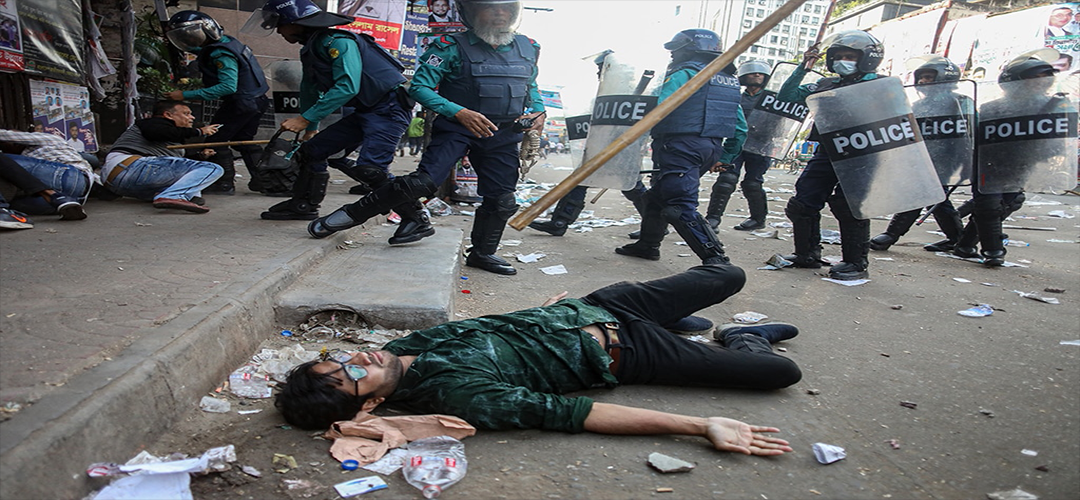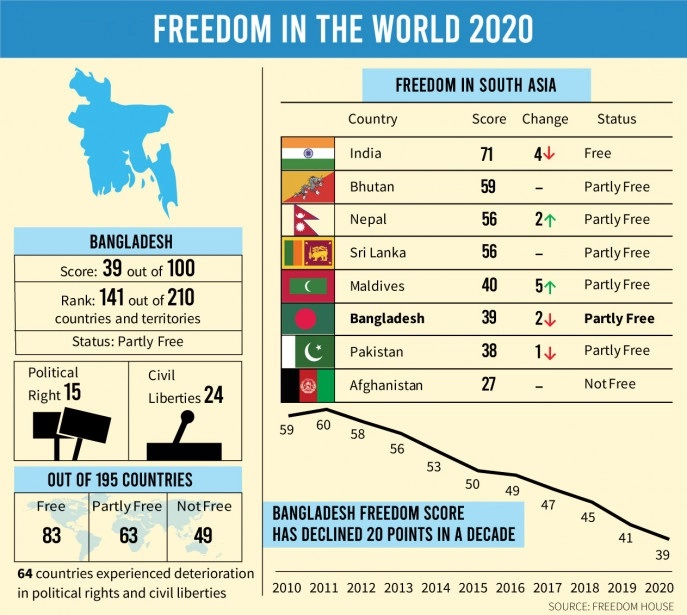A YEAR OF VIOLENCE AND PROTESTS
December 17, 2022 | Expert Insights

Free and fair elections are some of the best markers for a highly democratic country. But sadly, in most democracies in South Asia, they become venues for violent clashes between opposing political camps fuelled by immense election campaign chests funded through shady means. Our neighbour, Bangladesh, a thriving economy that has remained democratic for the last few decades, is no exception.
From using coercive means to brutal political violence, Bangladesh has witnessed it all. Over the last decade, Bangladeshi politics has been polarised to such a degree that opposition parties petulantly claim that the ruling Awami League (AL) has ensured its return to power for at least the next two terms!
The next general election is expected to be held by January 2024. With a whole year left ahead of the elections, the AL and its arch-rival, the Bangladesh Nationalist Party (BNP), have already started campaigning throughout the country. And it is natural for violence to mar the election campaigning. The opposition alleges that the AL has begun detaining opposition leaders in preparation for the next parliamentary elections.
The leader of Jamaat-e-Islami (JeL-the largest religious party in the country) was arrested for alleged ties to a militant group on 13th December. The arrest came days after the Jamaat-e-Islami party decided to join the anti-AL bloc to oust PM Hassina from power triggering violent protests. Earlier in the first week of December, more than a hundred BNP functionaries were injured during a rally in Dhaka after a brutal crackdown by the police. Such incidents will only escalate as the electoral campaigning gains momentum over the coming months.
Background
The rivalry between the BNP and AL dates back to 1978 when former President Ziaur Rahman founded the BNP on a nationalist platform to oppose the older centre-leftist AL party. Public support for both parties grew through the years, making them the most prominent players in Bangladeshi politics. In the late 2000s, when the AL came to power, the BNP attempted to overthrow the government but failed. In 2014, the BNP boycotted the general elections allowing the AL to strengthen its grip over the country. With the BNP’s boycott, opposition to the AL was significantly reduced. However, the boycott's impact was so detrimental that the BNP lost decades of popularity within a short period.
The recent protests and clashes between BNP and AL supporters began in August, with the BNP spearheading a nationwide campaign against increasing fuel prices and the cost of living. The protests eventually turned anti-incumbency, with multiple opposition parties like the JeL joining.
The formation of the anti-AL bloc threatened AL functionaries, who began disrupting regional and local rallies held by the BNP and other opposition groups. AL-backed transport workers' unions had strikes on the same day opposition groups held their protests. The strikes reduced the BNP's ability to mobilise the masses and hindered public transportation throughout the country. The AL also used the police to stop opposition movements from spreading across the country. Local authorities stalled rallies held by the BNP and AL affiliates, and the police targeted the ones that were conducted.

Analysis
Violence remains an inherent part of electoral campaigning in Bangla Desh. The country has consistently witnessed a spike in politically motivated crimes and violence during the 2008, 2014, and 2018 General Elections. In 2023, the country will inevitably face the same fate for the following reasons.
First, the clashes between AL and the opposition parties will likely worsen with the AL arresting popular opposition leaders. Moreover, AL members will be forced to hinder opposition parties from campaigning in their localities. With the support of law enforcement agencies, AL functionaries would be empowered to target the opposition. Opposition parties, however, will face the brunt of the law if they choose to retaliate.
Second, the infighting between BNP and AL has already contributed to public unrest and violence in areas like Sylhet and Jamalpur. The splits within both parties have become evident in certain areas where a lack of opposition has led to power struggles within party cadres. With the prominent leaders focused on winning key constituencies, little will they care about the local-level fights. If left unchecked, the schism between the BNP and the AL will cause more violent clashes.
Third, the use of force and coercion by the police and the counter-terrorism agency will be the most prominent driver of violence next year. The police have been accused of making illegal arrests, detainments, and crackdowns. On the other hand, the counter-terrorism units have slammed key opposition leaders with terrorism charges creating greater unrest. The repressive measures taken against anti-government entities extend to the media as well. As a result, Bangladesh lost its position as a "Free" country and became a "Partially Free" country in the Freedom Index in 2019. The country is yet to regain its "Free" status.
Assessment
- The AL and the BNP can change the nature of conflicts during an election year; however, it is unlikely that both parties would do it. Neither would want to be seen as weak and incapable of opposing the other.
- The growing threat of militancy in the Hill Tract region is another crucial threat to internal security that needs constant monitoring next year. With numerous militants arrested by the Rapid Action Battalion in Dhaka and Chittagong, more anti-militancy drives can be expected next year.








Comments